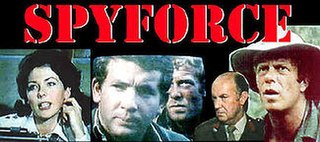Survivor(s) may refer to:

Harriet the Spy is a children's novel written and illustrated by Louise Fitzhugh that was published in 1964. It has been called "a milestone in children's literature" and a "classic". In the U.S. it ranked number 12 in The 50 Best Books for Kids and number 17 in The Top 100 Children's Novels on two lists generated in 2012.
The General or The Generals may refer to:
Spies most commonly refers to people who engage in spying, espionage or clandestine operations.
A dreamcatcher is a Native American cultural object.

Spycatcher: The Candid Autobiography of a Senior Intelligence Officer (1987) is a memoir written by Peter Wright, former MI5 officer and Assistant Director, and co-author Paul Greengrass. He drew on his own experiences and research into the history of the British intelligence community. Published first in Australia, the book was banned in England due to its allegations about government policy and incidents. These efforts ensured the book's notoriety, and it earned considerable profit for Wright.
Peter Maurice Wright CBE was a principal scientific officer for MI5, the British counter-intelligence agency. His book Spycatcher, written with Paul Greengrass, became an international bestseller with sales of over two million copies. Spycatcher was part memoir, part exposé of what Wright claimed were serious institutional failures in MI5 and his subsequent investigations into those. He is said to have been influenced in his counterespionage activity by James Jesus Angleton, the US Central Intelligence Agency (CIA) counterintelligence chief from 1954 to 1975.
Special or specials may refer to:
In law, a legacy is something held and transferred to someone as their inheritance, as by will and testament. Personal effects, family property, marriage property or collective property gained by will of real property.
A wall is a solid structure that provides a barrier or enclosure.
Outcast or Outcasts may refer to:

Spyforce is an Australian television series that aired from 1971 to 1973 on Nine Network. The series was based upon the adventures of Australian Military Intelligence operatives in the South West Pacific during World War II. It was produced by Nine Network in conjunction with Paramount Pictures.
Heroes or Héroes may refer to:
A darkroom is a room for processing light-sensitive photographic materials.
Boo is an onomatopoeic word for a loud, startling sound, as an exclamation intended to scare, or as a call of derision.
Spycatcher was a BBC television series, starring Bernard Archard, which ran from 1959 to 1961. It was based on the real-life activities of Dutch counterintelligence officer, Lieutenant-Colonel Oreste Pinto, who specialised in the interrogation of suspected spies during World War II and had later published his memoirs under the title Spy Catcher. Each episode showed Pinto (Archard) questioning refugees to England from Nazi-dominated Europe, and eventually exposing them as enemy agents.
Oreste Pinto was a Dutch counterintelligence officer and Lieutenant-Colonel. His activities during the Second World War, in which he worked with MI5 interrogating refugees to England, resulted in the capture of eight spies.
Spycatcher are a five-piece rock band from Watford, England, formed by ex-Cry For Silence member Steve Sears, Gallows bassist Stu Gili-Ross, and Mitch Mitchener of Haunts, plus William Taylor and Drew Elliott.
Scoundrel or Scoundrels may refer to:
Innocent means a lack of guilt with respect to any kind of crime, sin, or wrongdoing.
This page is based on this
Wikipedia article Text is available under the
CC BY-SA 4.0 license; additional terms may apply.
Images, videos and audio are available under their respective licenses.


